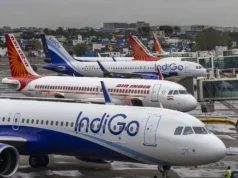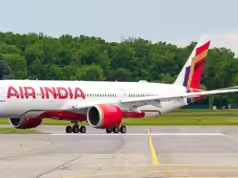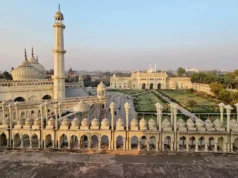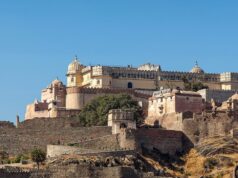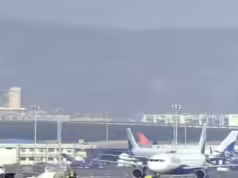The minister emphasized during the Rajya Sabha’s discussion of the Railways (Amendment) Bill 2024 that the annual rate of railway accidents has decreased from 171 instances to 30 due to a number of measures.
The government is prioritizing railway safety, according to Railway Minister Ashwini Vaishnaw, who claimed on Monday that more than Rs 1 lakh crore is allocated annually for the improvement of various systems.
The minister emphasized that the annual train accident rate has decreased from 171 incidents to 30 as a consequence of various measures during the Rajya Sabha’s discussion of the Railways (Amendment) Bill 2024.
He noted that a number of technological advancement projects are now under progress and underlined that the Modi administration has improved railway infrastructure more quickly.
By a voice vote, the Rajya Sabha approved the Railways (Amendment) Bill 2024. In December of the previous year, the Lok Sabha had already adopted the measure.
“Investments to improve safety used to be between Rs 8,000 and Rs 10,000 crore during the UPA administration. We are currently spending more than Rs 1.14 lakh crore annually to improve safety,” Vaishnaw stated.
“We are not content even after getting to this point. To address problems, we must address their underlying causes,” Vaishnaw stated.
According to Vaishnaw, steps have been taken to improve level crossings, safety equipment, and tracks. He noted that by installing flyovers or underpasses or sending out staff, the government had fully resolved safety issues at 9,000 unattended level crossings.
The field offices, which are run by Divisional Railway Managers and General Managers, now have a lot more authority, the minister added.
“GM now has complete authority to approve the deal, regardless of the tender amount—whether it is Rs 10 crore or Rs 1,000 crore. Additionally, GMs have the authority to approve projects under Rs 50 crore,” he stated, adding that decentralization over the past ten years has sped up work completion.
According to Vaishnaw, the prime minister is a strong advocate of cooperative federalism. He emphasized that the current railway budget has given them substantial funding, especially in places where the BJP is not in power.
The Modi government has allotted Rs 3,000 crore in states like Kerala, where the BJP is not in power. This is a significant increase above the Rs 372 crore allotted during the previous UPA government.
Tamil Nadu also received Rs 6,626 crore, which was a substantial rise over the Rs 870–880 crore allotted during the UPA administration. The amount allotted in Odisha has increased to Rs 10,000 crore from Rs 800 crore during the UPA administration. According to the minister, the Modi government has given West Bengal Rs 13,955 crore, a significant increase over the Rs 4,380 crore given by the UPA government.
He asked them to refrain from engaging in such trivial politics and asked, “On what basis do they claim discrimination with the state governments?” In response to the opposition’s claim that the government lost out on a chance to modernize the railways, Vaishnaw stated that a constant reform process has been underway for the past ten years. 34,000 km of new railway lines have been installed in the last 11 years, surpassing the whole network of a developed nation like Germany.
Over 45,000 kilometers of rails are already electrified,” he stated, adding that this will lessen pollution and reliance on fossil fuels, both of which are strategic imperatives. The minister responded to the dearth of facilities like restrooms by stating that more than 3.10 lakh restrooms had been installed inside railway trains during the past 11 years.
Regarding the idea of fewer job prospects, Vaishnaw pointed out that the NDA government had produced 5.02 lakh jobs, compared to 4.11 lakh established by the UPA government.
The SP’s Ramji Lal Suman expressed dissatisfaction, claiming that there are numerous open positions as a result of the Railways’ refusal to hold recruiting exams.
Vaishnaw stated that 1.26 crore students took part in the Railways’ most recent two exams, one of which was for Group D. The exam, which was administered in 15 languages, took place over 68 days in 133 shifts spanning 211 cities and 726 centers. He underlined that there were no paper leaks and the procedure was open and transparent.
Vaishnaw also downplayed opposition parties’ worries that the Railways (Amendment) Bill 2024 will weaken state governments’ authority and increase centralization. He explained that the purpose of the law is to enhance the Railway Board’s independence and efficiency.
The 1989 Railway Act will now incorporate the Railway Board, and the central government will be in charge of appointing the Chairman and the Board’s members as well as determining their credentials, tenure, and other requirements.
Additionally, the Bill includes provisions to choose an impartial regulator to supervise matters like fare determination and guarantee the railways’ competitiveness.
AAP’s Sandeep Kumar Pathak, CPIM’s V Sivadasan, SP’s Ramji Lal Suman, and BJP members Aditya Prasad and Pradip Kumar Varma took part in the conversation. While expressing support for the bill, Sandeep Kumar Pathak underlined the necessity of a railway management revamp.
Given that salaries and pensions now account for 70% of the funds, Pathak emphasized the significance of making investments in capacity building and increasing internal resources.
The rail ministry has come under fire from Sivadasan, who said it has “derailed.” In addition to pointing out that there are more than 2.5 lakh open posts, he contended that the quality of amenities is declining while premium tatkal service ticket prices are rising.
He claimed that although they are placing large cutouts of the prime minister at each train stop, they are not yet prepared to construct passenger restrooms.
